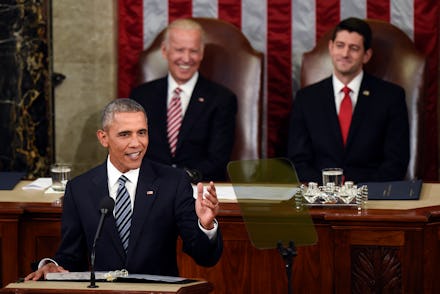Why Obama’s Last State of the Union Was Also a Campaign Speech

President Barack Obama decried partisan polarization in his final State of the Union address Tuesday night, lamenting that "the rancor and suspicion between the parties has gotten worse instead of better." For a man who once held out the lofty promise of a post-partisan climate of cooperation and conciliation, it marked "one of the few regrets of my presidency," he said.
In keeping with a speech bemoaning partisan hostility and recriminations, Obama summoned Americans to acknowledge that it was possible to disagree in good faith on hot-button issues like health care reform and the role of government. More important than the ideological differences that animate the political discourse, the president said, is the "common creed" citizens share as Americans.
Yet while Obama warned against the dangers of political division, his speech was, unavoidably, a decidedly partisan defense of his own legacy — and a reminder to the Democratic faithful of the stakes in the 2016 presidential election.
Obama knows full well that his legacy hinges on the election of a Democratic successor
A partisan pitch: Ticking off a list of accomplishments, Obama cited a spate of statistics on the recovering economy, his central focus when he assumed the presidency: "More than 14 million new jobs; the strongest two years of job growth since the '90s; an unemployment rate cut in half. Our auto industry just had its best year ever. Manufacturing has created nearly 900,000 new jobs in the past six years. And we've done all this while cutting our deficits by almost three-quarters."
The economy may have been the top priority when Obama moved to 1600 Pennsylvania Avenue, but his administration has also ushered in a landmark health care reform law, an overhaul of financial regulation, a series of historic initiatives to tackle climate change, deportation relief for millions of unauthorized immigrants, diplomatic breakthroughs with longtime adversaries like Iran and Cuba and profound social transformations, including the 2015 Supreme Court ruling for nationwide marriage equality.
These items each received a presidential shout-out Tuesday night, but Obama sought to make clear that his administration's achievements are not set in stone.
"[P]rogress," Obama said, "is not inevitable. It is the result of choices we make together. And we face such choices right now."
And with much of the nation's attention turned toward the contest to replace Obama, "the American people have a choice to make" once more, Obama said.
The choice: Obama framed that choice in stark terms.
Affirming his support for a free market economy, Obama hastened to add, "But after years of record corporate profits, working families won't get more opportunity or bigger paychecks by letting big banks or big oil or hedge funds make their own rules at the expense of everyone else; or by allowing attacks on collective bargaining to go unanswered. Food stamp recipients didn't cause the financial crisis; recklessness on Wall Street did."
"Immigrants aren't the reason wages haven't gone up enough; those decisions are made in the boardrooms that too often put quarterly earnings over long-term returns," Obama went on. "It's sure not the average family watching tonight that avoids paying taxes through offshore accounts. In this new economy, workers and start-ups and small businesses need more of a voice, not less."
Though he assiduously avoided wading into the increasingly competitive Democratic primary battle between Hillary Clinton and Bernie Sanders on Tuesday night, Obama often seemed to be singing from the same hymnal as Clinton, who in framing herself as the candidate best-positioned to safeguard the Obama legacy has warned Democrats of dire consequences if they lose the election to the GOP.
"I am absolutely determined that we're going to make sure we have a Democrat to succeed President Obama so we don't let the Republicans rip away the progress we have made together," Clinton has said, mentioning key progressive priorities like health care reform and financial reform.
Similarly, in touting the changes his administration ushered in, Obama was doing more than taking a victory lap. He knows full well that his legacy hinges on the election of a Democratic successor — and in underscoring the stakes of the 2016 election, Obama made clear that the same fervor for change that swept him to power nearly eight years ago could jeopardize his policies come January 2017.